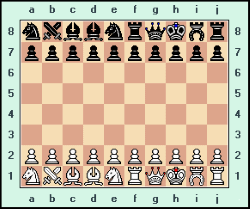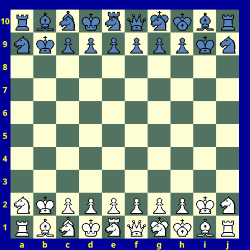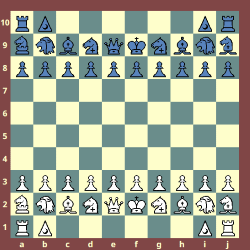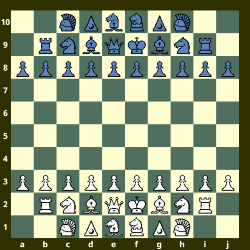Contest to design a 10-chess variant
The challenge
Unlike in previous contents, this one had no specific rule. There was only this:
Design a chess variant in which the number 10 plays a role.
You can design a variant on a 10 square board; or on a board of 10 by 10 squares; with 10 different types of pieces; and if you think a little about it, you may have some other more creative ideas how the number 10 can play a role in the variant.
The contest was somewhat informal. There were no prizes, only honor for the winner.
The winners
These were the 8 finalists, listed in order with the winner first:
 | Capablanca Random Chessby Reinhard ScharnaglFeatures a board with 10 files. CRC extends Capablanca's Chess with a randomized starting array, similar to the way Fischer Random Chess extends orthodox Chess. |
|
 | Eurasian Chessby Fergus DunihoFeatures a board with 10 ranks and 10 files. A synthesis of European and Asian forms of Chess, Eurasian Chess features the Cannons of Chinese Chess and its diagonal equivalent, as well as all the pieces of orthodox Chess. It is also influenced by another popular European variant, Christian Freeling's Grand Chess. |
|
 | Decimaby Mike NelsonFeatures 10 different non-pawn piece types on a board with 10 ranks and 10 files. It also has a unique objective: getting pieces worth 10 or more points on the tenth rank. This alternate victory condition requires a radically different strategy and makes the value of the pieces very hard to determine. |
|
 | Odin's Rune Chessby Gary K. GiffordFeatures a board with 10 ranks and 10 files. Created with an approach similar to that used by Carl Jung when he philosophized about the I Ching and the concept of synchronicity, the design of this game involved a random selection of runes. Odin's Rune has many pieces with unusual movement and capturing capabilities. |
|
 | Chess with Batteriesby Roberto LavieriFeatures a board with 10 ranks and 10 files. An unusual aspect is the addition of the Battery piece which augments the capabilities of adjacent friendly pieces. Most pieces have very limited capturing capabilities unless charged by an adjacent Battery. |
|
 | Opulent Chessby Greg StrongFeatures 10 different piece types on a board with 10 ranks and 10 files. It is an extension of Christian Freeling's Grand Chess with an augmented Knight and two additonal piece types. It is designed so that four different types of pieces are very close in material value. |
|
 | TenCubed Chessby David PaulowichFeatures 10 different piece types on a board with 10 ranks and 10 files. It combines the standard eight piece types from Capablanca's Chess with the Wizard and Champion from Omega Chess. The pattern of 52 empty squares is unique to this game. |
|
 | Countdownby Jared McCombFeatures the number ten in a very large number of ways: 10 players, 10 boards, 10 spaces per board, 10 points worth of Icehouse pieces per player in play, and 10! (ten-factorial) ways that the turn order can be decided. Combat is resolved in a manner which gives the attacker 10 favorable outcomes and the defender 10 favorable outcomes, and the combat victory bonus is always a multiple of 10 points; there are 10 special actions, each costing a multiple of 10 points to use; and the design of each individual board contains a 10-sided polygon in the middle, surrounded by the eight outer spaces. |
|
All contest submissions
- 10-directional Chess, by Jörg Knappen.
- 10 Minute Melee, by Mason Green.
- AtTENdance Chess, by Erez Schatz.
- The Bermuda Chess Angle, by Gary K. Gifford.
- Caïssa Brittania, by Fergus Duniho.
- Camel and Rhino Chess, by Tony Quintanilla.
- Capablanca Random Chess, by Reinhard Scharnagl.
- Chariots, by David Jagger.
- Chess with Batteries, by Roberto Lavieri.
- Countdown, by Jared McComb.
- d10 Chess, by Bruce Leban.
- Decima, by Mike Nelson.
- Ecumenical Eurasian Ninjachess, by Charles Gilman.
- Eurasian Chess, by Fergus Duniho.
- Hexa Decimal, by Joost aan de Brugh.
- Ladder Shogi, by Mason Green.
- Magi, by Neal Meyer.
- Manchala Chess, by Dhruv Manchala.
- Monster Bluff Chess, by Dale Holmes.
- MORE10, by Roberto Lavieri.
- Odin's Rune Chess, by Gary K. Gifford.
- Opulent Chess, by Greg Strong.
- Salmon P. Chess, by Dale Holmes.
- Shatranj Kamil (64), by David Paulowich.
- Stack Chess, by Doug Chatham.
- TenCubed Chess, by David Paulowich.
- TRiPLiCiTY, by David Jagger.
- Wildeurasian Qi, by Charles Gilman.
- Yagbap, by Jared B. McComb.
Non-competing submission:
- Franklin Grand Chess, by Ken Franklin.
Voting
Detailed voting rules can be found here. You can read more on the voting results here.
Contest Rules
Submissions were submitted by the deadline of April 30, 2005 either by email or on paper to Hans Bodlaender. These are the rules as originally specified:
- By submitting your game to the contest, you give us an irrevocable right to publish your variant, without charge, on the Chess Variant Pages and its offline versions. Copyright remains with the author, and you keep the right for publication elsewhere. But you cannot ask to have your variant removed from the website, not for any reason, not even when you do not win the contest. Also, you give the Chess Variant Pages an irrevocable right to create and publish files and/or webpages that enable computer and online play of your variant, e.g. Zillions of Games Rules files, or play on the Game Courier.
- In your entry, you may, if you want, also include a few sample games, comments, etc.
- If you submit a game, you should send the description of the game (either in html, MS Word, or text-format, with or without added pictures), i.e., it is insufficient to have the game on your own website and send the URL.
- Hans Bodlaender is preliminary judge. Submissions to the contest that are not a chess variant, which does not feature the number 10 in any way, or are deemed unsuitable for publication on the Chess Variant Pages for other reasons will be rejected in a preliminary round. Other submissions will be published on The Chess Variant Pages.
- A participant may submit at most two competing entries.
- The best games will be selected by a two round poll of Chess Variant Pages readers. See Polling below.
- An entry having its own variants will have only its 'main variant' judged.
- We offer the following tips: Mention games that have inspired you. Write correct English, and be clear and complete in giving rules. You may assume familiarity with the rules of standard chess. (For instance, you can write sentences like: Knights move like in orthodox chess. The purpose of the game is to mate the opponent's General. Stalemated players lose the game.)
Polling
First round poll
- The first round of voting will take place from June 30 through September 15, 2005.
- All readers of The Chess Variant Pages may vote.
- Please, when voting, take into condideration: originality, playability, and how the number 10 plays a role in the variant!
- The voting rules can be found here.
Second Round Poll
- The second round of voting will take place from September 15 through October 15, 2005, in the same fashion except:
- The Maximize Affirmed Majorities version of the Condorcet method will select the winners.
- The top five games in the second round will be declared to have won the contest.
- There are no prizes to be won this time, but there will be an email interview with the designer of the best game, and each of these five games will have a special logo displayed on its webpage.
Prizes
This contest is just for fun and honour! The winner will be asked to give an email interview, and the winning games get a special logo displayed on their webpages.
Submission format
- Send the rules in HTML, text, Word, or WordPerfect format. HTML or `plain ASCII text' are preferred: if you use Word or WP, see if your version allows you to save your file in such a format.
- Send the rules: do not just email the url of your own homepage!
- Many graphics files that can be used for your pictures can be found on the chessvariants.com website. Alternatively, you can use other methods to draw them, possibly using ASCII. Pictures may be sent as GIF or JPG, or on paper to be scanned. You might want to use the FFEN2HTM converter or Game Courier to make your diagrams.
- Changes or updates to your entries are allowed. However, in such a case you should edit the html-file yourself, and send the updated version to the submission address. Also, if someone else made your game suitable for Game Courier or Zillions of Games, and your change involves significant rule changes, we may require that you update the corresponding files yourself. No changes are allowed after the date of April 30, 2005.
- If you send a file plus a number of pictures, it would help to save my time if you pack everything in one zip-file and send that zip-file. Thanks! This is not obligatory, however.
Written by Hans Bodlaender. Webpage posted: February 7, 2005.
Last modified: October 6, 2018 by Greg Strong.
